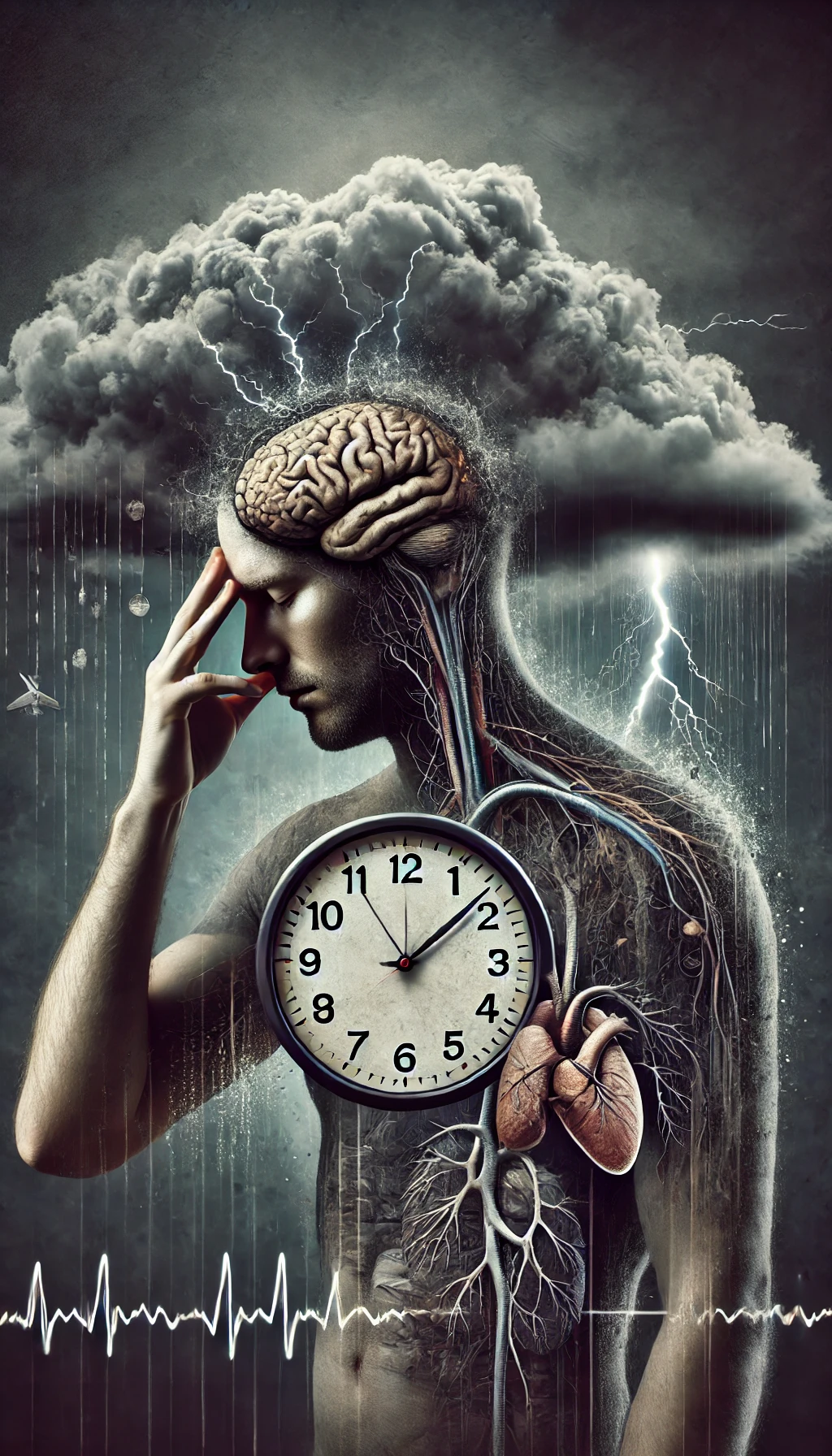Hey there, fellow wellness explorers! 🌟 Have you ever felt like stress is lurking around every corner, ready to pounce at the worst possible moment? If you’re anything like me, juggling work, family, and personal time can sometimes feel like an Olympic sport. 🏋️♀️ But fear not, because today, I’m sharing my journey from frazzled to fabulous, all thanks to some life-changing strategies that tamed my chronic stress beast. 🐉✨
Imagine this: constant tight shoulders, sleepless nights, and a mind that wouldn’t stop racing. Sound familiar? I knew something had to give, so I embarked on a mission to find serenity amidst the chaos. 🌸 Here’s a sneak peek into how I transformed my stress into bliss, and trust me, if I can do it, so can you! 💪💫
Ready to explore a whirlwind of mindfulness, adaptogens, and a sprinkle of self-love? Join me on this stress-busting adventure! 🚀💆♀️✨
Table of Contents
How to Know if You Have Chronic Stress
Hey friends! 🌟 Are you constantly feeling overwhelmed and exhausted, even after a good night’s sleep? Trust me, I’ve been there. Chronic stress isn’t just a buzzword; it’s a sneaky beast that can creep into our lives and wreak havoc on our health. Here are some signs that you might be dealing with chronic stress:
- Persistent Fatigue: Always tired, no matter how much rest you get.
- Sleep Disturbances: Tossing and turning, or waking up frequently during the night.
- Irritability and Mood Swings: Feeling more grumpy or down than usual.
- Muscle Tension and Pain: Persistent aches, tension headaches, or unexplained pains.
- Changes in Appetite: Eating way more or way less than usual.
- Difficulty Concentrating: Struggling to focus or remember things.
- Frequent Illnesses: Catching colds more often because your immune system is shot.
- Digestive Issues: Stomachaches, indigestion, or other tummy troubles.
- Emotional Exhaustion: Feeling completely drained and unable to cope with daily tasks.

If you’re nodding along to these symptoms, it might be time to take a closer look at your stress levels. Knowing where you stand can be the first step towards finding the right strategies to manage and reduce stress. 🌸✨
Interactive Stress Assessment
To help you figure out just how stressed you are, I’ve put together this fun and simple interactive survey. Answer the questions below to see where you fall on the stress spectrum and get some personalized tips on how to manage it.
Assess Your Chronic Stress Level
How often do you feel overwhelmed by your responsibilities?
How often do you experience difficulty sleeping or insomnia?
How often do you feel irritable or have a short temper?
How often do you struggle to find time for relaxation or self-care?
Hey there, fellow wellness explorers! 🌟 Have you ever felt like stress is lurking around every corner, ready to pounce at the worst possible moment? If you’re anything like me, juggling work, family, and personal time can sometimes feel like an Olympic sport. 🏋️♀️ But fear not, because today, I’m sharing my journey from frazzled to fabulous, all thanks to some life-changing strategies that tamed my chronic stress beast. 🐉✨
Imagine this: constant tight shoulders, sleepless nights, and a mind that wouldn’t stop racing. Sound familiar? I knew something had to give, so I embarked on a mission to find serenity amidst the chaos. 🌸 Here’s a sneak peek into how I transformed my stress into bliss, and trust me, if I can do it, so can you! 💪💫
Ready to explore a whirlwind of mindfulness, adaptogens, and a sprinkle of self-love? Join me on this stress-busting adventure! 🚀💆♀️✨
My Chronic Stress Story:
The Struggle
Balancing my demanding role as a software project lead for DOD projects with being a father of three amazing kids was already a lot on my plate, but add to that the stress of my mother who’s bravely battling chemo and my father who lives with me and I’m his caretaker, it felt like I was barely keeping my head above water. 🌊
To cope, I found myself turning to alcohol. At first, it seemed like a quick fix to unwind after a long day, but it quickly spiraled into a habit that only deepened my stress and deteriorated my health; I put on weight and had chronic digestive issues. Late-night snacking, poor diet choices, and sleepless nights became the norm. The hole I was in only seemed to get darker and deeper. 😞
The Turning Point
I knew something had to change, at 43, it’s kind of a “now or never” feeling (at least for me) that gave me the inner strength to take a personal stand to myself for myself. I decided to take control of my health and well-being, starting with my diet. I began focusing on eating whole, nutritious foods—fruits, vegetables, lean proteins, and healthy fats. Goodbye, late-night junk food binges, goodbye to alcohol, goodbye to most carbohydrates (breads and chips and other unnecessary carbs) aside from the occasional potatoes or wild rice for the time being! 🍎🥦
Exercise (I should say activity) became my sanctuary. Whether it was walking, a few pushups (literally, 3, 5 7 pushups here and there), or doing the stairs in my house, staying active helped me manage stress and feel more energized; interestingly it also helped me shift my mind when it wandered where I didn’t want it to. 🏃♂️🧘♂️
Embracing Adaptogens and Biohacking
I dove into the world of adaptogens, incorporating powerful stress-busters like ashwagandha and Rhodiola into my routine. These natural wonders helped me stay calm and collected. 🌿✨
- Ashwagandha is known for its ability to reduce cortisol levels, the body’s primary stress hormone. It helps improve mood, reduce anxiety, and enhance overall resilience to stress. 🧘♀️💖
FREE eBOOK: Ashwagandha & Brahmi – Ayurvedic medicine’s potent combination for fighting depression, anxiety and chronic stress. - Rhodiola boosts energy, improves mental clarity, and combats fatigue, making it easier to handle stress and maintain focus. It also supports the body’s ability to adapt to physical and emotional stressors. 🧠⚡
Together, these adaptogens work synergistically to help manage stress, improve mental and physical performance, and promote a balanced, calm state of mind. 🌟🌿
Biohacking techniques, like intermittent fasting and cold showers, became my secret weapons. They boosted my mental and physical resilience, giving me the edge I needed to tackle my day. 🚿💪
-
Intermittent Fasting ⏲️
Intermittent fasting involves cycling between periods of eating and fasting. This practice can help reduce stress by regulating insulin levels, enhancing brain function, and promoting cellular repair. It provides the body with time to rest and recover, which can lower overall stress levels. -
Cold Exposure ❄️
Cold exposure, through activities like cold showers or ice baths, can activate the body’s stress response in a controlled manner. This helps build resilience to stress by boosting endorphins, improving circulation, and reducing inflammation. It also enhances mental clarity and mood, contributing to overall stress reduction.
Prioritizing Sleep and Mindfulness
Sleep hygiene was a game-changer. I set a consistent sleep schedule and created a relaxing bedtime routine. No more tossing and turning! 🌙😴
Mindfulness and meditation helped me stay present and focused. Taking a few moments each day to breathe and center myself made all the difference. 🧘♀️🌸
Finding Balance
Now, I’m sleeping soundly, managing my workload more effectively, and most importantly, taking care of myself. I’ve learned to put myself in the equation, ensuring I’m not just a caretaker but also caring for myself. 🌟😊
Life is still busy, but I’m handling it with a clearer mind and a healthier body. Remember, it’s not about being perfect; it’s about making progress. If I can do it, so can you. Keep going, and don’t forget to show yourself some love along the way. ❤️
Stay strong, stay healthy, and keep shining! 💪🌟
This story reflects my real journey, full of ups and downs, but ultimately a testament to the power of self-care and determination. 🌟
10 Ways I Remedied Chronic Stress
Below you’ll find the top 10 things I felt I could be disciplined and do, minding that I of course was already feeling overwhelmed with what I “had to do” or “had to remember”. Hopefully you’ll find some benefit from one or more of these if you’re not already on it:
1. Prioritize Sleep Hygiene 🛌
Set a consistent sleep schedule. Create a relaxing bedtime routine—dim the lights, read a book, or take a warm bath. Avoid screens before bed to improve sleep quality.
2. Eat Nutritious Meals 🥗
Focus on a balanced diet with plenty of fruits, vegetables, lean proteins, and healthy fats. Avoid late-night snacking and processed foods.
3. Stay Active 🏃♂️
Incorporate physical activity into your daily routine. Find exercises you enjoy, like yoga, running, or even a brisk walk.
4. Try Adaptogens 🌿
Consider natural stress-relievers like ashwagandha and Rhodiola. These can help manage stress and improve resilience.
5. Practice Mindfulness 🧘♀️
Dedicate a few minutes each day to mindfulness or meditation. Use apps like Headspace or Calm to guide you through exercises.
6. Stay Hydrated 💧
Drink plenty of water throughout the day. Staying hydrated can improve energy levels and overall well-being. 1% dehydration is absolutely 10% loss of strength and stamina.
7. Take Breaks 🛑
Take regular breaks, especially if you’re working on a computer (blue light). 5 minute breaks every hour can help reduce stress and improve focus.
8. Connect with Loved Ones ❤️
Spend quality time with family and friends. Social support is crucial for managing stress and maintaining a positive outlook.
9. Limit Alcohol and Caffeine 🚫
Cut down on alcohol and caffeine, as they can disrupt sleep and increase anxiety. Opt for herbal teas or water instead.
10. Seek Professional Help 👩⚕️
Don’t hesitate to seek help from a healthcare professional or therapist; they provide valuable support and resources.
Interactive Timeline of Chronic Stress Damage
6 Months
After 6 months of chronic stress, you may experience persistent fatigue, frequent headaches, and heightened anxiety levels. 😓
1 Year
At the 1-year mark, chronic stress can lead to digestive issues, weakened immune system, and increased risk of heart disease. 💔
2 Years
Two years of chronic stress might result in severe insomnia, chronic muscle tension, and significant weight changes. 🛌💪
5 Years
Five years in, chronic stress can cause long-term mental health issues like depression, along with cardiovascular problems. 🧠❤️
10 Years
A decade of chronic stress can lead to serious health conditions, including diabetes, severe anxiety disorders, and memory loss. 🍭🧠


Interactive Timeline of Benefits from Reducing Chronic Stress
6 Months
After 6 months of reducing chronic stress, you may experience improved sleep, better mood, and increased energy levels. 🌙😊⚡
1 Year
At the 1-year mark, you may notice enhanced cognitive function, better digestion, and stronger immunity. 🧠🍽️💪
2 Years
Two years of stress reduction can lead to healthier skin, stable weight, and improved cardiovascular health. 🧴⚖️❤️
5 Years
After five years, you may enjoy sustained mental clarity, balanced hormones, and reduced risk of chronic diseases. 🧘♂️🧬🚫
10 Years
A decade of reduced stress can result in overall longevity, greater resilience, and a more fulfilled, happy life. 🌟💪🌿
Overcoming chronic stress is a journey, and it’s one worth taking. 🌟 My story is a testament to the incredible transformation that comes from prioritizing self-care, healthy habits, and mindfulness. From the dark days of self-medicating and poor lifestyle choices, I’ve found a balanced, fulfilling life.
Remember, you’re not alone in this. Start with small changes—incorporate adaptogens, practice mindfulness, stay active, and nourish your body with nutritious foods. Every step, no matter how small, brings you closer to a stress-free life. 🌿
Stay strong, be kind to yourself, and keep moving forward. You’ve got this! 💪😊💕 Also, reach out if you need to, I ALWAYS respond.
Disclaimer
This content is for informational purposes only and does not constitute medical advice. Always consult with a doctor or medical specialist before making any health-related decisions, including detoxing, cleansing, or engaging in any activities mentioned. Your health and safety are paramount, and professional guidance is essential to ensure the best outcomes for your individual needs.

